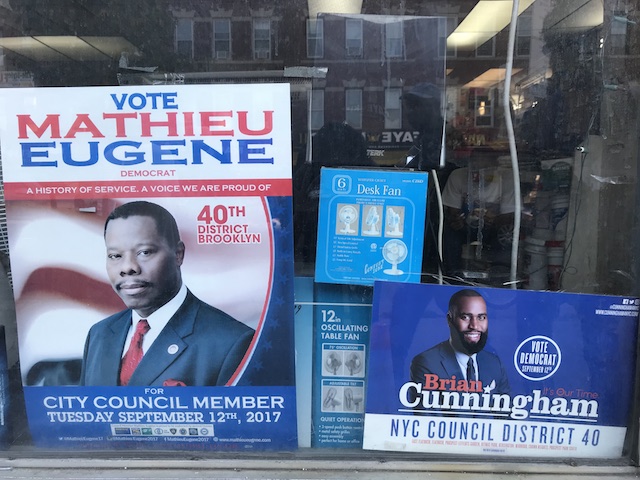At the office of Council Member Mathieu Eugene, it’s business as usual. Flatbush locals are seated inside the waiting area, listening for their name to be called, and hopefully for an issue to be resolved. The Council Member returns from a few meetings, shaking his constituents’ hands and conversing jovially with them in French Creole.
Exactly one month before the election, Eugene isn’t sweating it. He earned 40% of the vote in the Democratic primaries, ten percentage points ahead of his opponent, Brian Cunningham. Cunningham has decided to run in the general election as the Reform Party candidate, but Eugene, a potential third-termer, is confident. “I’m convinced I’m going to win,” Eugene says, as he leans back into his maroon armchair.
Today, he’ll launch his next initiative, ‘District 40 Cares,’ a community drive for hurricane and earthquake relief in Puerto Rico, the Caribbean Islands, and Mexico. It’s the first formal effort by the district, where many are from the affected areas, to provide direct aid to the victims.
Eugene says a strong sense of déjà vu moved him to take action. “This program is a moral obligation for me,” he says, recounting the huge devastation caused by the earthquake in his homeland of Haiti in 2010. Numerous Puerto Rican constituents have described to him the harrowing details of utter destruction of the island, families they haven’t been able to contact, and sheer lack of food and water. He knows the uphill battles these people face and says he feels compelled to “fulfill the American tradition to respond to tragedy.”
Eugene’s political rival, Brian Cunningham, has tweeted his support of the Council Member’s relief efforts, but the alliance ends there. Eugene is unabashed in his criticism of Cunningham, whom he says lacks the experience to hold office. Cunningham was a member of Community Board 14 for more than a year when he announced his candidacy, but for Eugene, that’s not enough.
Eugene’s main complaint is that Cunningham did not “respect the process” after losing in the Democratic primary. “The one that flips — is that the person you want? It’s not easy to get people to vote in New York City, people sacrifice a day off work to vote, or wait in long lines after work, which is why we have to respect the vote.”
Despite his challenger’s supposed shortcomings, Eugene says he’s not taking anything for granted. He’s convinced his “consistent track record” is something his constituents can rely on. After all, they were the people that urged him to go into politics in the first place. “The community pushed me,” he says. Like Cunningham, Eugene also ran for City Council after a stint on Community Board 14, with one key difference—he was on the board for a decade.
What happens if he doesn’t win?
“There is no such thing,” says Eugene.


Leave a Reply